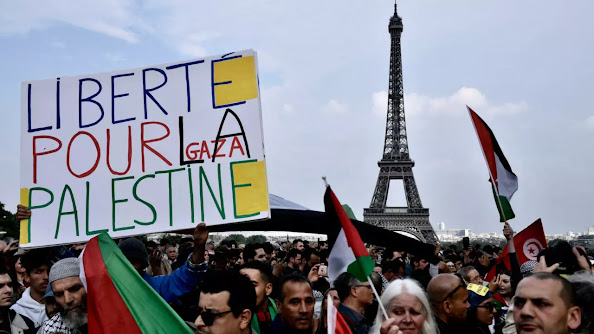Protests over Israel’s response multiply, France and Germany try to ward off anti-Semitic acts
Deadly conflict between Israelis and Palestinians has in the past sparked protests and intense flare-ups of anger in Europe, sometimes leading to anti-Semitic acts, particularly in 2014, when Israel invaded the Gaza Strip.
And with the current conflict intensifying and more protests being organized, officials in France and Germany are taking steps to avoid a repeat.
France banned a pro-Palestinian protest planned for this weekend in Paris, sparking an intense political debate and an unsuccessful court challenge from the organizers of the demonstration, and the government has deployed police around the country in anticipation of other protests and possible violence.
In Germany, where protesters this week attacked synagogues, burned Israeli flags and marched through the streets chanting slurs against Jews, law enforcement readied for several demonstrations in Berlin on Saturday and officials said that anti-Semitism would not be tolerated.
Felix Klein, a German official tasked with countering anti-Semitism, said: “It is appalling how obviously Jews in Germany are being held responsible here for actions of the Israeli government in which they are completely uninvolved.”
He called on Muslim associations to “distance themselves from violence against Jews and attacks on their places of worship, to call for nonviolence and to exert a de-escalating influence on the Muslim community in Germany.”
The ban on the weekend protest planned for Paris was requested by France’s interior ministry. The police authorities complied, citing the “sensitive” international context, as well as the risk of “troubles to public order” and acts of violence against synagogues or Israeli interests in the French capital.
“There can be no hateful demonstration, no anti-Semitic demonstration in France,” Gérald Darmanin, the French interior minister, told reporters in Lille on Friday. He said that police would be widely deployed in Paris and elsewhere in France to contain any unrest and protect France’s Jewish community, the largest in Europe.
Protests were also planned in large cities such as Marseille, Strasbourg and Lyon.
Political parties on the right and center supported the ban, and Anne Hidalgo, the Socialist mayor of Paris, called it a “wise decision.”
But organizers of the protest filed an emergency motion in court, arguing that there had been many peaceful pro-Palestinian demonstrations since 2014 and accusing the French government of being too favorable toward Israel. On Friday evening, the court upheld the ban.
And with the current conflict intensifying and more protests being organized, officials in France and Germany are taking steps to avoid a repeat.
France banned a pro-Palestinian protest planned for this weekend in Paris, sparking an intense political debate and an unsuccessful court challenge from the organizers of the demonstration, and the government has deployed police around the country in anticipation of other protests and possible violence.
In Germany, where protesters this week attacked synagogues, burned Israeli flags and marched through the streets chanting slurs against Jews, law enforcement readied for several demonstrations in Berlin on Saturday and officials said that anti-Semitism would not be tolerated.
Felix Klein, a German official tasked with countering anti-Semitism, said: “It is appalling how obviously Jews in Germany are being held responsible here for actions of the Israeli government in which they are completely uninvolved.”
He called on Muslim associations to “distance themselves from violence against Jews and attacks on their places of worship, to call for nonviolence and to exert a de-escalating influence on the Muslim community in Germany.”
The ban on the weekend protest planned for Paris was requested by France’s interior ministry. The police authorities complied, citing the “sensitive” international context, as well as the risk of “troubles to public order” and acts of violence against synagogues or Israeli interests in the French capital.
“There can be no hateful demonstration, no anti-Semitic demonstration in France,” Gérald Darmanin, the French interior minister, told reporters in Lille on Friday. He said that police would be widely deployed in Paris and elsewhere in France to contain any unrest and protect France’s Jewish community, the largest in Europe.
Protests were also planned in large cities such as Marseille, Strasbourg and Lyon.
Political parties on the right and center supported the ban, and Anne Hidalgo, the Socialist mayor of Paris, called it a “wise decision.”
But organizers of the protest filed an emergency motion in court, arguing that there had been many peaceful pro-Palestinian demonstrations since 2014 and accusing the French government of being too favorable toward Israel. On Friday evening, the court upheld the ban.




Comments
Post a Comment